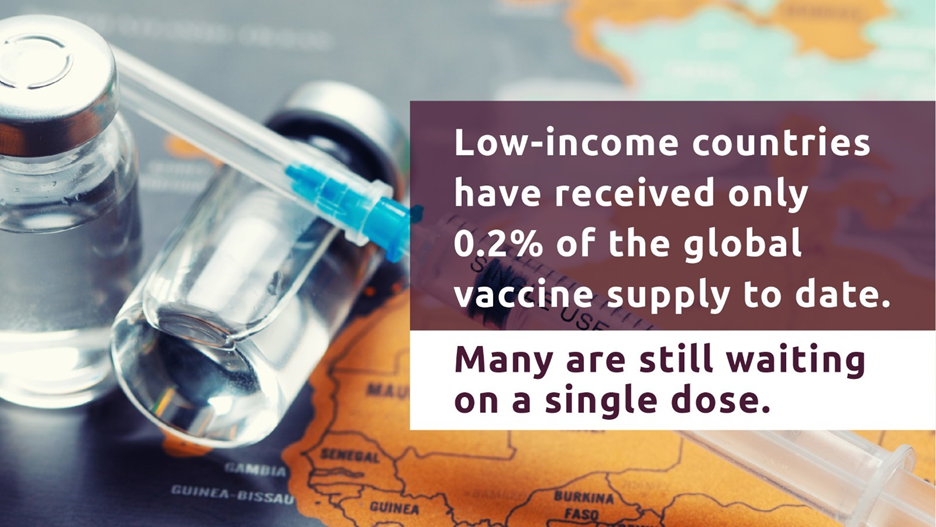
by Cooperation Canada | May 10, 2021 | News, ODA Advocacy, Responding to Covid-19
Cooperation Canada, alongside CanWaCH and social justice advocates across the country, urges Canada to do more in supporting mechanisms crucial to fight COVID19 and foster a fair global recovery.
Read our letter to Prime Minister Justin Trudeau about the TRIPS waiver, cosigned by Julia Anderson, CEO of CanWaCH, and our Chief Executive Officer, Nicolas Moyer.
It focuses on Canada’s support to India and South Africa’s proposal to waive the relevant obligations under the World Trade Organization’s Agreement on TRIPS, the COVID-19 Technology to Access Pool (CTAP) and the creation of a Canadian advisory group to explore solutions to the inequitable global response to COVID-19.


by Cooperation Canada | Apr 19, 2021 | Feminist Foreign Policy, News, Policy, Responding to Covid-19
Keeping Canadians safe is the most important role of the government. That means eradicating COVID-19 from around the world, urgently addressing the climate crisis, and ensuring an equitable pandemic recovery. Our economy is global, our population is multicultural, and we cannot solve global challenges in isolation. Canada will not recover until the world recovers.
Today, the Government of Canada announced budgetary measures aimed at eradicating COVID-19. This includes $375 million towards the global pandemic response – a critical contribution that will save lives. Yet this modest figure stands in contrast with the Government’s commitments last year, amounting to an estimated $1.2 billion and does not reflect or respond to the dire humanitarian needs around the globe: with 97 million people pushed to extreme poverty and 270 million facing acute hunger. COVID-19 is not a fleeting crisis. It calls for political leadership and strategic investments to make up for the 25 years of human development progress lost in the first 25 weeks of the global pandemic. Today’s budget is a missed opportunity to demonstrate such political leadership.
Women and girls, marginalized communities and historically disadvantaged countries are bearing the brunt of the harshest economic, social, and health effects of the crisis. Securing their futures requires ambitious action. This is why the international development sector has been calling for the government to invest 1% of its COVID response to support the global response and recovery. Today’s Budget provides for $375 million in COVID-19 global response, encapsulated in a $1.4 billion increase in international assistance, spread over five years. Such an increase emerges as insufficient against the backdrop of the biggest global crisis in a generation and the need for long-term investments in mechanisms of global health, social protection and economic collaboration on which depends our ability to recover from COVID-19 and prevent and mitigate future crises.
Canada is currently contributing far below its global fair share and its international commitments, investing only 30 cents in international assistance for every 100 dollars in gross national income. Despite an increase last year, Canada continues to perform below the average of donors of the Organisation for Economic Co-operation and Development (OECD). Low levels of funding, exacerbated by unpredictable new allocations that follow political trends and media attention instead of the humanitarian needs and development strategies, are threatening the achievement of the government’s own Feminist International Assistance Policy.
Canadians understand the need for a bold budget with robust measures to address the crisis within and beyond our borders. While Canada grapples with its own vaccine roll-out, many lower-income countries have not received a single dose, endangering lives, and threatening the health and economic recovery everywhere.
“The COVID-19 pandemic has shown us how important it is to address global crises in a timely manner,” said Nicolas Moyer, CEO of Cooperation Canada. “Canada’s international development and humanitarian sector has been calling on the Government to commit to a strategic, long-term investment in global solutions to the multiple concurrent crises affecting us everywhere. This Budget missed an opportunity to answer those calls.”
Today was also not the day Canada presented a vision for addressing international climate challenges. Looking forward, the Government must tackle the climate crisis with determination. This means allocating Canada’s fair share of the global climate finance commitments, which corresponds to $1.8 billion in annual contributions, on top of the current international assistance levels. Our global crises cannot be solved in isolation. Climate adaptation and mitigation, humanitarian interventions and development efforts are mutually reinforcing and as such deserve comprehensive and strategic investments that match the severity and the urgency of the crises we are facing everywhere.
Canada has an opportunity to do better later this year at the G7 Summit and the Paris Climate Conference (COP21) with a chance to invest in progressive and principled global development, that is in everyone’s interest. It is time to commit meaningfully to effective efforts to build back healthier, safer, more equitable and sustainable communities for us all.
Media Contact
Kat Guerin
Communications Manager
[email protected]
About Cooperation Canada
Cooperation Canada brings together and advocates for Canada’s international development and humanitarian organizations by convening sector leaders, influencing policy and building capacity. Together, we work with partners both inside and outside Canada to build a world that’s fair, safe and sustainable for all.
by Cooperation Canada | Aug 27, 2020 | News, Responding to Covid-19
COVID-19 has exposed inequalities at home, and around the world. The pandemic has exacerbated pre-existing gaps in access to resources, health, and food and has disproportionately impacted already-marginalized groups. These disparities are only becoming more lethal as the world waits to act. It is estimated that COVID-19 will push 71 million people into extreme poverty and 265 million into acute food insecurity; and result in 117 million missed child vaccinations and 31 million additional cases of gender-based violence. The world must act now to protect the lives of the most vulnerable and ensure no one is left behind.
COVID-19 has also exposed the interconnectedness of our world. The virus has demonstrated that the world’s health system is only as strong as the weakest among us, and that our collective well-being is bound up in one another, as COVID-19 anywhere is a threat to us all, everywhere.
Canada has mobilized to stop the spread of COVID-19 at home, but the effects of the virus are felt around the world. They are particularly felt in the global south where the spread of the virus is accelerating, and where existing inequalities are exacerbating the negative impacts of the disease. For instance, due to impacts of COVID-19 on access to sexual and reproductive health and rights services, the deaths of an additional 253,500 children and 12,200 women in the next six months are expected in the least severe scenario projections. The reality of school closures has also impacted families around the globe. One and a half billion children and youth have already missed out on an education, and may never return as a result, due to school closures.
For decades, Canada has championed human rights and gender equality, both at home and abroad. During one of the gravest crises in a century, Canada can play a leading role in building an equitable and just global recovery. A bold and ambitious investment in such a recovery, would show the world fair and generous Canadian leadership, and would also be an investment in a stronger, healthier, more resilient Canada. Through this pandemic, if anything, we have all learned that we are better and stronger when we are together.
While Canada must prioritize the security and wellbeing of Canadians, it must also do its fair share to ensure an effective COVID-19 response globally. There is an urgent need for an immediate investment to mitigate the potentially catastrophic impacts of COVID-19 in the world’s most vulnerable countries. To work towards ending COVID-19 everywhere, and as part of an investment in a just recovery, the Canadian Council for International Cooperation (CCIC) calls on Canada to commit at least 1% of its total COVID response – or $2 billion in new and additional funds – to a global response that tackles the spread of the virus and its secondary impacts in the poorest countries.
This investment should lay the groundwork for additional investments in international development to ensure that Canada supports our neighbours around the world in recovering better.
The world needs Canadian leadership right now, the health and well-being of the world’s most vulnerable and Canadians at home, depend on it.
by Cooperation Canada | Apr 6, 2020 | News, Responding to Covid-19
FOR IMMEDIATE RELEASE
Open Letter to Government: A Global Response to a Global Pandemic
OTTAWA, ON – April 6, 2020 – On behalf of over 180 organizations, the Canadian Council for International Co-operation (CCIC) and four partner coalitions presented an open letter to the Honourable Karina Gould, Minister of International Development, calling for international cooperation to be a part of Canada’s COVID-19 response.
“To keep Canadians safe, we need to address and eliminate the disease wherever it is in the world,” said Nicolas Moyer, CEO of CCIC. “By lending our expertise and support to communities around the world, we can defeat COVID-19.”
CCIC applauds the Government of Canada’s commitment to global engagement and cooperation to address the pandemic, including the allocation of $159.5M through Canada’s International Assistance Envelope. The open letter proposes further measures to help Canada’s fight against the global pandemic through an increase of Canadian Aid and the fast-tracking of funding renewals for multi-year international programs, among other proposals.
The international development sector includes over 2,000 organizations, employs some 14,000 Canadians on a full-time basis, and invests over $5 billion annually to support global sustainable development and humanitarian assistance. Like all sectors of the Canadian economy, Canadian aid organizations are coping with the unprecedented COVID-19 crisis, while also working hard to ensure critical front-line services continue for the most vulnerable populations around the globe. CCIC and its members look forward to continuing to work with the federal government to support global efforts to address and contain COVID-19.
The open letter was sent in collaboration with the Canadian Association of International Development Professionals (CAIDP), the Canadian Partnership for Women and Children’s Health (CanWaCH), the Climate Action Network (CAN-Rac) and the Inter-Council Network (ICN).
-30-
About the Canadian Council for International Co-operation (CCIC):
The Canadian Council for International Co-operation (CCIC) is Canada’s national association representing international development and humanitarian organizations. Together with our member organizations, CCIC seeks to end global poverty and to promote social justice and human dignity for all. CCIC is committed to making this goal a public priority and to encouraging the actions necessary to make a poverty-free world a reality.
Media Contact:
Kat Guerin, Communications Manager
[email protected]
Phone: 613-222-3009
by editor | Apr 5, 2020 | News, Responding to Covid-19
FOR IMMEDIATE RELEASE
The Canadian Council for International Co-operation welcomes federal investment of $159.5 million to support global fight against COVID-19
OTTAWA, ON, April 5, 2020 – The Canadian Council for International Co-operation (CCIC) applauds today’s federal government announcement of an allocation of $159.5 million in funding to support global efforts to respond to the COVID-19 crisis and its impacts on the world’s most vulnerable people.
Today’s announcement includes a previous commitment to provide $50 million to international assistance to the World Health Organization and other partners in response to the novel coronavirus. It is part of the government’s $107 billion investment to fight the pandemic both at home and abroad. As Canada rightly continues to prioritize the safety of Canadians, CCIC and its members encourage the federal government to contribute significantly and proportionally to a global pandemic response. Canada’s continued investment in international assistance during this time will help those most vulnerable to the impact of the virus—those living in poor countries with weak public health systems—while also helping to prevent its further spread and entrenchment.
“This virus knows no borders,” said Nicolas Moyer, CEO of CCIC. “To effectively respond to this global pandemic, we need a global approach. Canada’s commitments today will enable and equip partners to support the world’s most vulnerable people so that every family is protected in this crisis and nobody is left behind.”
Today’s enhanced commitment acknowledges that the response to this global pandemic will require global solutions. Canadian international development and humanitarian workers are on the front lines of prevention and response to COVID-19. Their brave work – supported by Canadian investments like the one announced today – protects vulnerable populations in developing countries as well as Canadians at home and around the world. Canada’s development and humanitarian workers are helping ensure that a potential second wave of this pandemic is stopped before it starts, and this money will help our neighbours as well as keep Canadians safe. This investment will help Canadian assistance and health workers do their vital jobs around the world.
CCIC member organizations are active around the globe aiding communities at risk in this pandemic. CCIC and its members look forward to continuing to work with the federal government to support global efforts to address and contain COVID-19.
-30-
About the Canadian Council for International Co-operation (CCIC):
The Canadian Council for International Co-operation (CCIC) is Canada’s national association representing international development and humanitarian organizations. Together with our member organizations, CCIC seeks to end global poverty and to promote social justice and human dignity for all. CCIC is committed to making this goal a public priority and to encouraging the actions necessary to make a poverty-free world a reality.
Media Contact:
Kat Guerin, Communications Manager
[email protected]
Phone: 613–241-7007 ext. 343
Cell phone: 613-222-3009
by editor | Mar 20, 2020 | News, Responding to Covid-19
FOR IMMEDIATE RELEASE
The Canadian Council for International Co-operation applauds federal investment of $8M to help global fight against COVID-19
OTTAWA, On, March 20, 2020 – The Canadian Council for International Co-operation (CCIC) welcomes today’s federal government announcement of $8M to the World Health Organization, the Pan-American Health Organization, the United Nations High Commissioner for Refugees and the International Federation of the Red Cross and Red Crescent Societies to fight the spread of the coronavirus in developing countries.
Today’s announcement initiates implementation of last week’s federal commitment to provide $50M in international assistance to the World Health Organization and other partners in response to the COVID-19 crisis. This is part of the government’s $1.1-billion financial investment to fight the pandemic both domestically and abroad.
This commitment acknowledges that while investing in domestic systems is essential, the fight against a global pandemic on the scale of COVID-19 also requires that Canada contribute to global responses. Canadian investment in development aid supports the sustainability and success of Canada’s own health care system.
“We are seeing so clearly this week that what happens elsewhere affects us all,” said Nicolas Moyer, CEO of CCIC. “With a pandemic like this one, the global response is only as strong as the weakest link in a network of public health systems. Even as we respond at home to protect Canadians, many people living in highly vulnerable conditions around the globe also need and deserve our attention.”
Canada’s continued investment in international assistance during this time will help those most vulnerable to the impact of the virus—those living in poor countries with weak public health systems—while also helping to prevent its further spread and entrenchment. CCIC and its members in Canada’s international cooperation community look forward to continuing to work with the federal government to support global efforts to address and contain COVID-19.
CCIC member organizations are hard at work around the globe providing assistance to communities at risk in this pandemic.
-30-
About the Canadian Council for International Co-operation (CCIC):
The Canadian Council for International Co-operation (CCIC) is Canada’s national association representing international development and humanitarian organizations. Together with our member organizations, CCIC seeks to end global poverty and to promote social justice and human dignity for all. CCIC is committed to making this goal a public priority and to encouraging the actions necessary to make a poverty-free world a reality.
Media Contact:
Kat Guerin, Communications Manager
[email protected]
Phone: 613–241-7007 ext. 343
Cell phone: 613-222-3009
Media Availability: March 20 after 2 p.m. EDT
Nicolas Moyer, CEO
[email protected]
Phone: 613-241-7007 ext. 323
Cell phone: 613-796-8145



